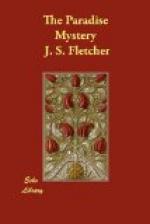“Collishaw saw what happened?” he repeated. “That, of course, is theory—supposition. But now we pass from theory back to actual fact. I’ll tell you something now, Mitchington, which you’ve never heard of, I’m certain. I made it in my way, after Collishaw’s death, to get some information, secretly, from his widow, who’s a fairly shrewd, intelligent woman for her class. Now, the widow, in looking over her husband’s effects, in a certain drawer in which he kept various personal matters, came across the deposit book of a Friendly Society of which Collishaw had been a member for some years. It appears that he, Collishaw, was something of a saving man, and every year he managed to put by a bit of money out of his wages, and twice or thrice in the year he took these savings—never very much; merely a pound or two—to this Friendly Society, which, it seems, takes deposits in that way from its members. Now, in this book is an entry—I saw it—which shows that only two days before his death, Collishaw paid fifty pounds—fifty pounds, mark you!—into the Friendly Society. Where should Collishaw get fifty pounds, all of a sudden! He was a mason’s labourer, earning at the very outside twenty-six or eight shillings a week. According to his wife, there was no one to leave him a legacy. She never heard of his receipt of this money from any source. But—there’s the fact! What explains it? My theory—that the rumour that Collishaw, with a pint too much ale in him, had hinted that he could say something about Braden’s death if he chose, had reached Braden’s assailant; that he had made it his business to see Collishaw and had paid him that fifty pounds as hush-money—and, later, had decided to rid himself of Collishaw altogether, as he undoubtedly did, by poison.”
Once more Bryce paused—and once more the two listeners showed their attention by complete silence.
“Now we come to the question—how was Collishaw poisoned?” continued Bryce. “For poisoned he was, without doubt. Here we go back to theory and supposition once more. I haven’t the least doubt that the hydrocyanic acid which caused his death was taken by him in a pill—a pill that was in that box which they found on him, Mitchington, and showed me. But that particular pill, though precisely similar in appearance, could not be made up of the same ingredients which were in the other pills. It was probably a thickly coated pill which contained the poison;—in solution of course. The coating would melt almost as soon as the man had swallowed it—and death would result instantaneously. Collishaw, you may say, was condemned to death when he put that box of pills in his waistcoat pocket. It was mere chance, mere luck, as to when the exact moment of death came to him. There had been six pills in that box—there were five left. So Collishaw picked out the poisoned pill—first! It might have been delayed till the sixth dose, you see—but he was doomed.”




